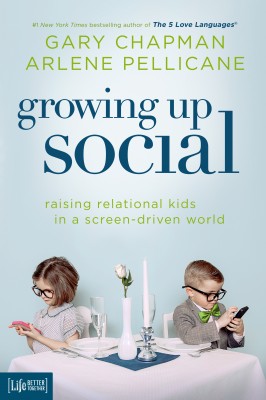 Some of the most frequent questions I'm asked as the founder of CatholicMom.com relate to the raising of children in today's media-saturated culture. Honestly, I'm often stumped as to how to respond. My own sons, now 23 and 20 years of age, grew up in days when the worlds of technology and entertainment were far less complex than they are today.
Some of the most frequent questions I'm asked as the founder of CatholicMom.com relate to the raising of children in today's media-saturated culture. Honestly, I'm often stumped as to how to respond. My own sons, now 23 and 20 years of age, grew up in days when the worlds of technology and entertainment were far less complex than they are today.
Thankfully, we have many great new resources to help us as parents who desire to raise faith-filled children in a screen-driven age. I'm happy to share the following interview with Arlene Pellicane, co-author of the new book Growing Up Social: Raising Relational Kids in a Screen-Driven World. I think you'll find her responses helpful and do hope that you'll check out this terrific resource.
Q: Please briefly introduce yourselves to our readers.
I’m a wife and mom of three kids, ages 4, 7 and 10. We live in San Diego. I’ve written four books including 31 Days to Becoming a Happy Wife and Growing Up Social: Raising Relational Kids in a Screen-Driven World. I love speaking to women of all ages to encourage them that having a happy home is possible with God’s help.
Q: Please offer a few words of introduction for Growing Up Social:. What motivated you to write this book? Why is a resource like this so crucial for today's families?
Very quickly, technology has become center stage in many American homes. Kids are connecting with screens more than they are with family members. This is a huge concern – whether you’re looking at a family staring at smart phones and tablets while dining at a restaurant or you’re trying to interact with a child who won’t look up from a video game. Childhood is when a boy or girl’s heart is like wet cement – kids are open to our teaching, love, and guidance. We don’t want to miss this important window because we are too busy with our technology, or because we are entertaining our children, not training them.
The family has become much more digitally dependent since 2007 when the iPhone was introduced. My son was born before the iPhone and I remember going to the grocery store with him as a toddler. We pointed at fruit, looked for the Cheerios box, and I had to teach him how to behave in public. Today toddlers are too busy on their tablets or their mom’s smart phone in the grocery store to look around. With technology become more and more integrated in daily life, now more than ever, we have to decide how (and how much) we’re going to use it.
 Q: While you offer some terrific suggestions for modifying our children's behavior with respect to electronic devices, it seems clear to me in reading your work that the adults in families will also have to commit to some changes. Why is it important that parents buy into the limitation of screens in their own lives?
Q: While you offer some terrific suggestions for modifying our children's behavior with respect to electronic devices, it seems clear to me in reading your work that the adults in families will also have to commit to some changes. Why is it important that parents buy into the limitation of screens in their own lives?
When you boil it down, kids are going to imitate what their parents do – not necessarily what they say. In one study at the University of Washington, babies at just 42 minutes were already imitating adults. When the adult stuck his tongue out, the baby did the same. Babies grow to become children who watch where a parent focuses attention. If a parent is constantly checking emails, responding to texts and tweets, and digitally accessible most hours of the day, a child will mirror that by constantly using screens as well.
As adults, we have to become comfortable with calls going to voicemail and texts not being answered at the speed of light. Most of the time, it’s wiser to play a board game with our kids then to get caught up with social media.
Q: You spend much needed time in the book underscoring the importance of raising "relational" kids -- could you please say a few words on what this means and why it is so critical in today's world?
We present five A+ skills that a healthy child will possess: appreciation, affection, anger management, apology and attention. For example, if a child can appreciate what he or she has, that gratitude will take them far in life. Grateful people are less depressed, complain of fewer physical ailments, and do better in school. What kind of spouse, parent, employee or employer is your child becoming? Will he or she have the emotional skills to deal with both failure and success? Having real-life relational skills is more useful and important than having the high score on a game or the most friends on Facebook.
Q: Is there hope out there for the parent who feels that his or her family is already too far gone into the mess of electronic media?
Yes, there is always hope as long as your children live under your roof. Of course, it is easier to make adjustments when your children are younger. Instead of coming down hard on your child because she’s watching too much TV, you can actually begin with an apology. Talk to your child and say something like, “I owe you an apology. I’ve allowed you to do watch unlimited TV and that hasn’t been healthy for you. I’m sorry about that. I have been lazy about enforcing the rules or even communicating the rules clearly. We’re going to gradually make some changes so that you will become a healthier adult.” Those changes may include a decrease in screen time, an outside play time, a short walk around the block each night to talk, or family reading or game night.
Q: How can faith help a family to place relationships above gadgets?
If you are going to work to have more face time with your family and less screen time, you need to begin with the question, “Why?” Why is it important to you? If you are a person of faith, you will be motivated by a deep desire for your children to follow in the faith. You will most likely want to read the Bible together, pray and attend church. Those activities put people and relationships above gadgets. My faith in God gives me a call as a parent – to train my children to obey God and to live by the Golden Rule. Those goals are very relational; there is not really an app out there they can teach my child to love others as he loves himself.
Arlene Pellicane is a speaker and author of Growing Up Social: Raising Relational Kids in a Screen-Driven World (co-authored with Gary Chapman) and 31 Days to Becoming a Happy Wife.
Arlene has been featured on the Today Show, Family Life Today, and The 700 Club. She earned her BA from Biola University and her Masters in Journalism from Regent University. She lives in San Diego with her husband James and three children.
Visit Arlene at www.ArlenePellicane.com for free family resources including a monthly Happy Home podcast.
Copyright 2014 Lisa M. Hendey
About the Author

Lisa M. Hendey
Lisa M. Hendey is the founder of CatholicMom.com, a bestselling author and an international speaker. A frequent radio and television guest, Hendey travels internationally giving workshops on faith, family, and communications. Visit Lisa at LisaHendey.com, on her Substack at LisaHendey.Substack.com, or on social media @LisaHendey for information on her speaking schedule or to invite her to visit your group, parish, school or organization. Find Lisa’s books on her Amazon author page.



.png?width=1806&height=731&name=CatholicMom_hcfm_logo1_pos_871c_2728c%20(002).png)
Comments